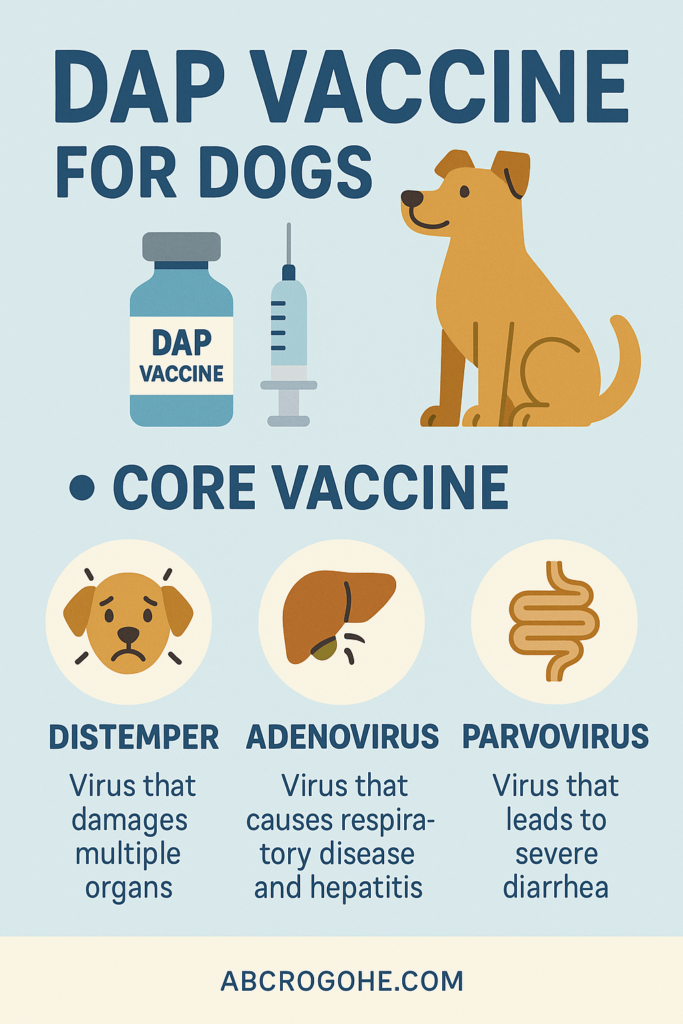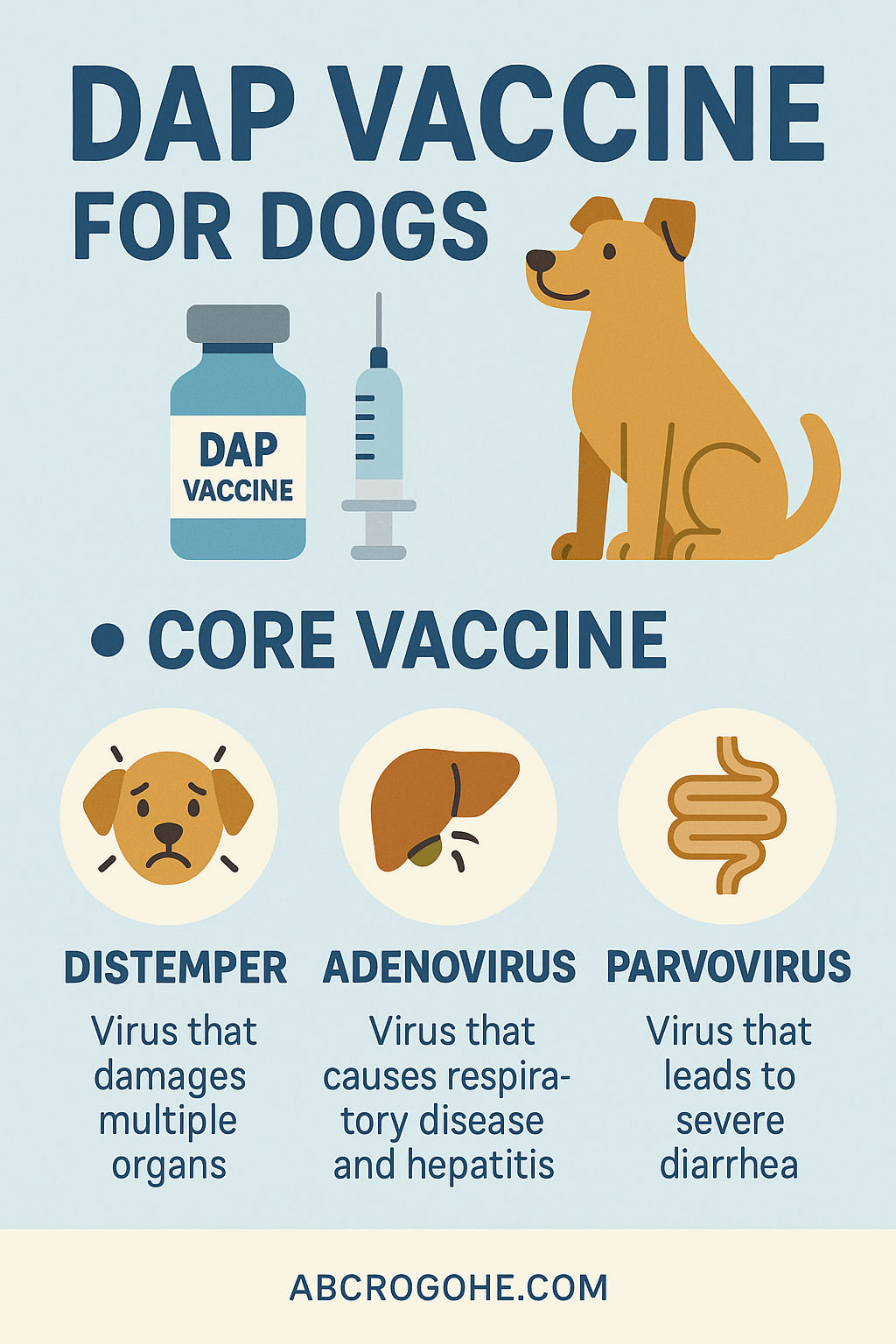DAP Vaccine for Dogs: What You Need to Know
When it comes to protecting your furry friend from infectious diseases, vaccinations play a crucial role in ensuring their long-term health and well-being. One such essential vaccine is the DAP vaccine for dogs, which shields them from three highly contagious and potentially life-threatening illnesses: distemper, adenovirus (hepatitis), and parvovirus. Understanding what the DAP vaccine entails, why it’s important, and how it fits into your dog’s overall healthcare plan is vital for every responsible pet owner. In this blog post, we’ll break down everything you need to know about the DAP vaccine, from its benefits to potential side effects, so you can make informed decisions for your canine companion.
Expert Insight on Targeted Vaccines in Dogs
“The use of targeted vaccines allows us to provide more effective protection against specific diseases while reducing the risk of adverse reactions. By focusing on key antigens, we can tailor the vaccine to the individual needs of each dog, ensuring maximum efficacy and safety.”
What Does the DAP Vaccine Protect Against?
The DAP vaccine is a core vaccination that provides immunity against three serious diseases. Each of these conditions poses unique risks to dogs, making the vaccine an essential part of their preventative care routine.
Distemper:
Distemper is a viral disease that attacks the respiratory, gastrointestinal, and nervous systems. It spreads through airborne droplets and can be fatal if left untreated.Adenovirus (Hepatitis):
Canine adenovirus type 1 causes infectious hepatitis, which affects the liver and other organs. Symptoms include fever, abdominal pain, and lethargy.Parvovirus:
Parvovirus is a highly contagious virus that attacks the intestinal tract, causing severe vomiting, diarrhea, and dehydration. Puppies are especially vulnerable to this disease.
Together, these illnesses represent significant threats to unvaccinated dogs, highlighting the importance of the DAP vaccine in safeguarding your pet’s health.

Benefits of the DAP Vaccine for Dogs
The DAP vaccine offers numerous advantages beyond simply preventing disease. Here’s why it’s considered a cornerstone of canine healthcare.
Long-Term Immunity:
The DAP vaccine provides lasting protection against distemper, adenovirus, and parvovirus, reducing the need for frequent booster shots.Prevention of Severe Symptoms:
Vaccinated dogs are less likely to develop severe symptoms if exposed to these viruses, improving their chances of recovery.Protection for Vulnerable Puppies:
Puppies are particularly susceptible to these diseases, and early vaccination helps build their immune systems during critical developmental stages.Community Health Benefits:
Widespread vaccination reduces the spread of these viruses within the dog population, protecting even unvaccinated animals through herd immunity.Cost-Effective Prevention:
Treating diseases like parvovirus can be expensive and emotionally taxing; vaccination is a cost-effective way to avoid these challenges.
By vaccinating your dog with the DAP vaccine, you’re not only protecting them but also contributing to the health of the broader canine community.
Check this guide 👉Dog Cancer Vaccine: Best 7 Expert Tips!
Check this guide 👉Lyme Vaccine for Dogs: Best 7 Expert Tips!
Check this guide 👉What Is the CPIV Vaccine for Dogs? Best 7 Expert Tips!
Key Components of the DAP Vaccine | Potential Risks Without Vaccination |
|---|---|
Protects against distemper | High risk of neurological damage |
Prevents adenovirus (hepatitis) | Liver failure and organ damage |
Shields against parvovirus | Severe dehydration and death |
Provides long-term immunity | Increased vet bills and emotional stress |
Essential for puppies’ health | Spread of viruses to other dogs |
When Should Your Dog Receive the DAP Vaccine?
Timing is critical when it comes to administering the DAP vaccine. Understanding the recommended schedule ensures your dog receives optimal protection.
Initial Puppy Vaccinations:
Puppies typically receive their first DAP vaccine at around 6-8 weeks of age, followed by boosters every 3-4 weeks until they are 16 weeks old.Adult Booster Shots:
Adult dogs require periodic booster shots, usually every 1-3 years, depending on their lifestyle and risk factors.High-Risk Environments:
Dogs frequently exposed to other animals, such as those in kennels or dog parks, may benefit from more frequent vaccinations.Pregnant or Nursing Dogs:
Consult your veterinarian before vaccinating pregnant or nursing dogs to ensure safety for both the mother and her puppies.Travel Considerations:
If you plan to travel with your dog, check local regulations, as some areas may require up-to-date vaccinations.
Following this schedule ensures your dog remains protected throughout their life.
Possible Side Effects of the DAP Vaccine
While the DAP vaccine is generally safe, like any medical intervention, it can have mild side effects. Being aware of these helps you monitor your dog’s response after vaccination.
Mild Discomfort at Injection Site:
Some dogs may experience swelling or tenderness where the vaccine was administered. This typically resolves within a few days.Lethargy or Fatigue:
It’s common for dogs to feel tired or sluggish for a day or two following vaccination.Loss of Appetite:
A temporary decrease in appetite is normal but should return within 24-48 hours.Mild Fever:
A low-grade fever may occur as the immune system responds to the vaccine.Rare Allergic Reactions:
In very rare cases, dogs may experience allergic reactions, such as facial swelling or difficulty breathing. Seek veterinary care immediately if this occurs.
Most side effects are minor and short-lived, but always consult your vet if you notice anything unusual.
Signs Your Dog Needs Immediate Veterinary Attention After Vaccination
Although rare, adverse reactions to the DAP vaccine can occur. Recognizing these signs ensures prompt treatment and peace of mind.
Facial Swelling:
Sudden puffiness around the face or eyes could indicate an allergic reaction.Difficulty Breathing:
Labored or rapid breathing requires immediate attention, as it may signal a severe reaction.Persistent Vomiting or Diarrhea:
These symptoms could suggest an overactive immune response to the vaccine.Extreme Lethargy:
If your dog seems unusually weak or unresponsive, contact your vet right away.Hives or Rash:
Raised bumps on the skin often accompany allergic reactions and should be evaluated promptly.
Quick action can prevent complications and ensure your dog recovers fully.
Tips for Reducing Stress During Vaccination Visits
Vet visits can be stressful for dogs, but there are ways to make the experience smoother and less intimidating.
Bring Familiar Items:
Take along a favorite blanket or toy to provide comfort and familiarity in an unfamiliar environment.Stay Calm Yourself:
Dogs pick up on their owner’s emotions; staying relaxed helps keep them calm too.Use Positive Reinforcement:
Reward your dog with treats or praise before and after the visit to create positive associations.Practice Car Rides:
Regularly taking your dog for short car trips reduces anxiety during travel to the vet.Communicate with Your Vet:
Let the staff know if your dog is particularly nervous so they can take extra steps to soothe them.
A calm and supportive approach makes vet visits easier for everyone involved.
Alternative Ways to Support Your Dog’s Immune System
While vaccines are essential, additional measures can further bolster your dog’s overall health and immunity.
Balanced Diet:
Feeding high-quality food rich in vitamins and minerals supports a strong immune system.Regular Exercise:
Daily physical activity keeps your dog fit and boosts their natural defenses against illness.Routine Check-Ups:
Regular vet visits allow early detection of potential health issues before they become serious.Hydration:
Ensuring your dog drinks plenty of water aids digestion and flushes toxins from their body.Stress Reduction:
Minimizing stress through mental stimulation and a stable environment promotes overall wellness.
Combining these practices with vaccinations creates a holistic approach to your dog’s health.
Frequently Asked Questions About the DAP Vaccine for Dogs
Is the DAP vaccine mandatory?
While not legally required everywhere, it’s considered a core vaccine by veterinarians and is strongly recommended for all dogs.
Can my dog get sick from the vaccine?
No, the vaccine contains inactivated or modified viruses that cannot cause illness but stimulate immunity.
How much does the DAP vaccine cost?
Costs vary depending on location and clinic, but it’s generally affordable and covered under many pet insurance plans.
What if I miss a vaccination appointment?
Contact your vet to reschedule. They’ll guide you on catching up without compromising your dog’s protection.
Is the DAP vaccine safe for senior dogs?
Yes, older dogs can safely receive the vaccine, though underlying health conditions should be evaluated beforehand.
Investing in Your Dog’s Health with the DAP Vaccine
The DAP vaccine is a simple yet powerful tool in safeguarding your dog’s health and happiness. By protecting them from distemper, adenovirus, and parvovirus, you’re giving them the best chance at a long, healthy life. While no vaccine is entirely without risk, the benefits of the DAP vaccine far outweigh any potential drawbacks. As a responsible pet owner, staying informed and adhering to vaccination schedules ensures your furry friend remains protected. Remember, prevention is always better than cure—so prioritize your dog’s health today with the DAP vaccine.
Do Cats Have Taste Buds? Best 7 Expert Tips! – Discover how cats experience flavors and why their taste is so unique.
Do Dogs Have Taste Buds? Best 7 Expert Tips! – Discover how dogs experience taste, their preferences, and what it means for their diet and health.
Can Cats Taste Sweet? Best 7 Expert Tips! – Discover why cats can’t taste sweetness, how it affects their diet, and tips to keep them healthy and happy.
Can Dogs Taste Sweet? Best 7 Expert Tips! – Discover how dogs perceive sweetness, which foods are safe, and tips to manage their sweet cravings responsibly.





